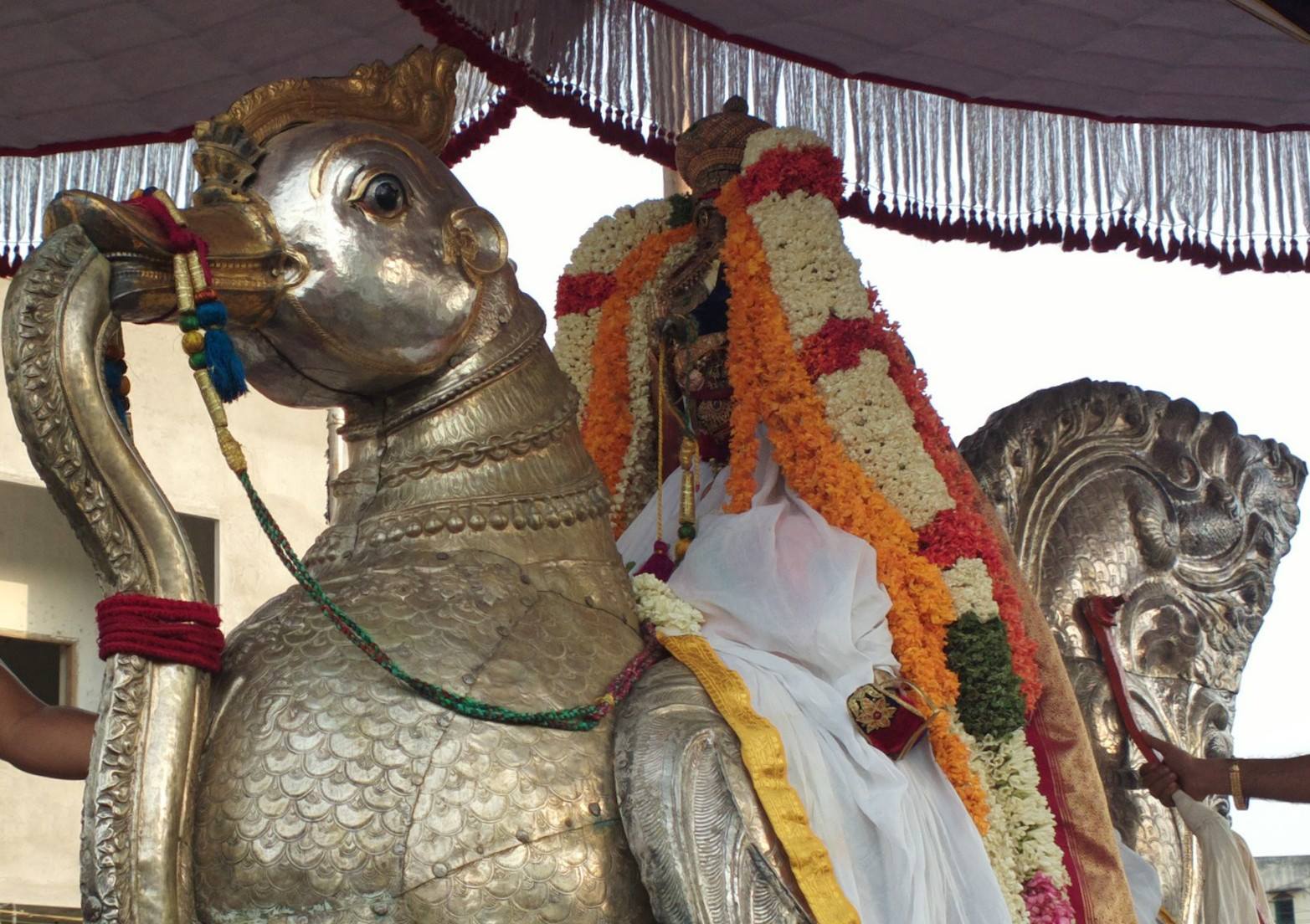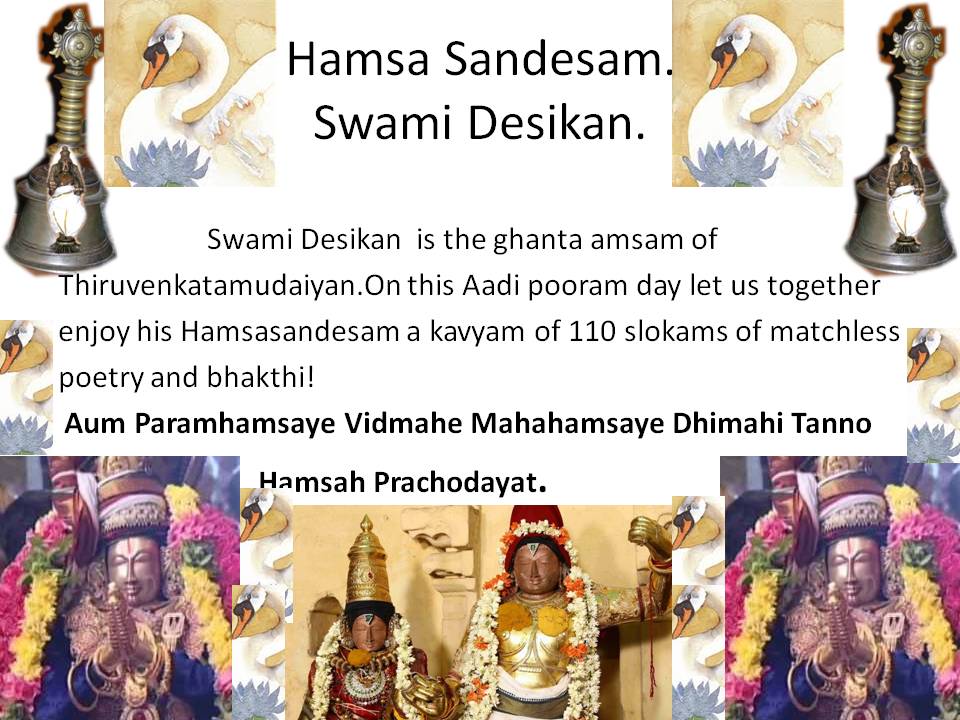A tribute Swami Desikan paid to Sri Ranganatha through one of his Kavyams is known as Hamsa Sandesam. The other Kavyams of Swami Desikan are: Subhashitaneevi, Yadavaabhudhyam and Padhuka Sahasram.
Hamsa Sandesam is what is known as a Sandesa Kavyam. This Kavyam follows the style of Andal and Nammazhwar, when they requested clouds, birds and bees to take a message to their Lord and asked them to help in uniting them with their beloved Lord. In more recent times, Poet Kalidasa Composed Megha Sandesam, where he asks the hurrying clouds to take a message to his beloved one in the Northern region.
Swami Desikan sets Hamsa Sandesam as a Kavyam, where Sri Ramachandra languishing from the sorrow of separation from His beloved Sita sights a Raja Hamsam and implores it to take a southward journey to Lankapuri and asks the hamsam to convey to Sita his sense of anguish and inconsolable desolation. There are 110 slokas in this Kavyam set by Swami Desikan in the Mandaakrantha Meter.
Sri Rama points out the landmarks that the hamsam will fly over in its southward journey. In this Kavyam, we get a glimpse of the Sarva Tantra Swatantrar’s extraordinary knowledge about the geography of Bharata Desam.
His choice of hamsam as a messenger to convey Sri Rama’s pangs of separation is very similar to the Vipralambha Mood of separation experienced by the Nayakis such as Parakala and Paraankusa Nayaki. The mood is very similar to that we experience of Parakala Nayaki (Thirumangai Azhwaar) in the Thirupullani Pasurams (Periya Thirumozhi 9.4) and Paraankusa Nayaki’s Pasurams (Eg: Thiruvaimozhi 9.9). Paraankusa and Parakala Nayakis have begged the cranes and parrots to convey their sense of forlornness and despair, while possessed by the mood of Vipralambha Sringaram.
This Kavyam has both poetic majesty as well as philosophical message in the form of Rahasyaartham. Swami Desikan’s reverence for Sri Ranganatha, the family deity of Sri Ramachandra is also brought out in number of Slokas of this Kavyam.
Swami Desikan describes the majestic flight of the Messenger of Rama over the Thiruvenkatam hills, Kanchipuram, Chola Desam. The Hamsam follows aerial course along the banks of Cauveri River. Sri Rama then points out to the expectant swan the sights it will see during its southern journey. He says that you will see an island formed by Cauveri and in the middle of it; you will see Chandra Pushkarani and the sacred Sesha Peetam. On that Peetam, You will see the future site where Sri Ranga Vimanam and Sri Ranganatha are going to rest. Rama asks the hamsam to offer its salutations to the deity sacred to the Ishvaku dynasty. The second half of the 44th slokam describes the sighting of the Chandra Pushkarini by the hamsam:
Teerthairanyairapi Parigathaam Suddhihetoh Samanthaath |
Chandrollaasaprathita Yasasa: Sampatam Pushkarinyaa: ||
Sri Rama says that “you (hamsam) will see the holy Pushkarani, which will have the beautiful lustre of the Moon and you will recognize its holiness by the fact that many theerthams (waters) are resting next to this Pushkarani to attain holiness for themselves by situating themselves in the proximity of the Chandra Pushkarani. You will also witness the richness and sampath associated with Chandra Pusharani all around it.”
The prosperity or the Eiswaryam that he has in mind is described by him in the next verse:
Teereh Tasyaa Virachitapadham Saadhubhi: Sevyamaanam Sraddhaa Yogaath Vinamita Tanu: Sesha Peetam Bhajethaa: |
Yasmin Asmath Kuladhanatayaa Sowmya Saaketa Bhaaja: |
Sthaanam Bhavyam Munibhirudhitam Srimatho Rangadhaamna: ||
Sri Rama says to the hamsam that it will see on the banks of Cauveri, the Sesha Peetam that is worshipped from time immemorial by the Yogis and Bhagavathaas. He asks the hamsam to bow deeply before the Sesha Peetam. Sri Rama reveals to the hamsam that sacred site will be the future site of Sri Ranganatha’s Pranava Vimanam with Para Vasudeva at its crest.
At this point, Sri Rama reminisces about the Aprameya Swaroopam that is resting under the Sri Ranga Vimanam that He worshipped every day at Ayodhyaa. His thoughts now return to his capital, while He is talking to the hamsam at the pool side in Dandakaaranyam. Overcome by the thought of the beauty of Sri Rangaatha, Sri Rama says that His family heirloom is visible as a Superior, matchless emerald gem enshrined on the holy seat on top of the Sesha Peetam. The sloka celebrating Sri Ranganatha”s glory is as follows:
Sattveh Divyeh Svayamudhayatas Tasya Dhaamna: Prasanghaath Manjuushaayaam Maragatamiva Bhraajamaanam Tadhanta: |
Cheto Dhaavatupahita Bhujam Seshabhogeh Saayanam Dheergaapaankam Jalathi Tanayaa Jeevitam Devamaadhyam ||
Here Rama reveals that the Sesha Peetam is made up of Suddha Sattvam, free from the trigunaas. On top of that Sesha Peetam, Lord Ranganatha emerged as the Svyam Vyaktha (self-manifest) Mahaa Purusha. He appeared there of his own volition. There, He is resting on Adi Sesha and is placing His head on his right hand, while looking at Maha Lakshmi, worshipped at this Kshetram as Sri Ranga Nayaki. The description of the land marks continue and includes Kshethrams like ThiruveLLarai as he points the road map to the attentive Hamsam. The Kavyam ends with Rama’s blessings to the hamsam for undertaking such an important journey.
Commentary by Sri Oppiliappan Sadagopan
The following is the pictorial representation of the introduction and video for introduction and Dhyana Slokas of Hamsa Sandesam by Smt Jayanthi Sridharan…










